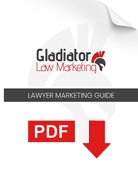
I. Introduction
Family and divorce attorneys are exploiting the power and reach of digital marketing to connect with prospective clients. One tool that has proven to be invaluable in this pursuit is Pay-Per-Click (PPC) advertising.
This article dives into the impact of PPC strategies on family and divorce law practices. It offers a detailed guide to harnessing the power of online marketing, providing a strategic pathway to success in a competitive legal landscape.
II. Pay-Per-Click Advertising
Pay-Per-Click (PPC) is an online advertising model requiring advertisers to pay a fee each time one of their ads is clicked. This method stands in contrast to organic traffic generation strategies, which rely on naturally attracting visits to a site. Instead, PPC is about purchasing visits to your site, providing a more predictable and controllable source of traffic.
For family and divorce attorneys, PPC advertising presents a dynamic and flexible channel to promote their services across a range of online platforms. It’s a way to effectively reach their target audience, ensuring their message is heard by those who need it most.
PPC provides a level of precision targeting that is unparalleled in other forms of digital marketing. It enables lawyers to connect directly with individuals who are actively seeking family or divorce legal services. By choosing keywords strategically, PPC ads can be triggered when potential clients search for specific terms related to family or divorce law, allowing them to reach the right people at the right time.
There are several key platforms that offer PPC advertising opportunities. These include Google Ads, Bing Ads, Facebook, and LinkedIn. Each platform offers its unique advantages, allowing attorneys to tailor their PPC campaigns according to their specific goals and target audience.
By understanding the nuances of each platform and leveraging their strengths, family and divorce attorneys can make the most of PPC advertising, transforming their online presence and boosting their practice. We will now provide an in-depth exploration of these platforms and offer practical advice on creating effective PPC campaigns that yield significant results.
III. Benefits PPC Offers to Family and Divorce Lawyers
This powerful digital marketing tool empowers legal professionals to significantly enhance their online presence, extend their reach, and grow their client base in a highly targeted and cost-effective manner.
Precise and Targeted Advertising
One of the most compelling advantages of PPC is its capacity for precise targeting. PPC advertising offers granular targeting options, such as location, demographics, and interests, enabling lawyers to reach audiences that are highly relevant to their practice.
For instance, an attorney who specializes in family law in San Francisco can meticulously tailor their ads to display only to locals who have demonstrated an interest in family legal matters. This level of precision ensures that their campaign is optimized for effectiveness, minimizing wasted ad spend on irrelevant audiences and maximizing the impact on those most likely to require their services.
Instant Visibility and Immediate Results
In contrast to Search Engine Optimization (SEO), which typically yields results gradually over time, PPC advertising provides immediate visibility. As soon as a PPC campaign is launched, it begins driving traffic to the lawyer’s website, generating leads and inquiries right away.
For lawyers eager to acquire clients swiftly, PPC places them at the top of Search Engine Results Pages (SERPs), capturing the attention of individuals actively seeking legal representation. This immediate visibility can provide a significant boost to a law firm’s client acquisition efforts.
Cost Control
PPC advertising affords lawyers a high degree of control over their advertising budget. They can set daily and monthly spending limits, ensuring they never exceed their financial parameters.
Moreover, PPC operates on a pay-per-click model, meaning payments are only made when users interact with the ad by clicking on it. This approach allows attorneys to get the most out of their advertising budget, ensuring they only pay for ads that are performing well and attracting engagement.
Transparent and Measurable ROI
One of the key strengths of PPC campaigns is their transparency and measurability. PPC platforms provide comprehensive analytics and reporting tools that give a clear picture of the campaign’s performance.
Key metrics such as click-through rates (CTR), conversion rates, and cost-per-acquisition (CPA) offer valuable insights that can inform data-driven decision making. This means that lawyers can continuously refine and optimize their campaigns based on these metrics, leading to improved results and an enhanced return on investment over time.
Campaign Customization
PPC advertising offers a wealth of customization opportunities. Lawyers have the freedom to create compelling ad copy that resonates with their target audience, emphasizing their unique strengths, expertise, and messaging.
By carefully selecting relevant keywords, they can enhance their ad’s quality score, leading to higher SERP rankings and increased visibility. This level of customization allows them to differentiate themselves from their competitors, establishing a distinct and memorable presence in the crowded online marketplace.
IV. The Components of PPC Ads
For family and divorce lawyers looking to maximize the effectiveness of their PPC advertising campaigns, a thorough and well-considered strategy is vital. This involves several key steps that, when combined, can significantly enhance online visibility and client acquisition. Below, we delve into these strategies in detail, offering a comprehensive guide to mastering PPC for legal professionals specializing in family and divorce law.
A Deep Dive into Keyword Research
The cornerstone of any successful PPC campaign is the careful selection of relevant keywords. Keywords act as a bridge, connecting the lawyer’s ad campaigns with the search queries of potential clients. By identifying and utilizing the terms and phrases that your target audience is likely to use when seeking legal assistance, you can ensure your ads are seen by the right people at the right time.
There are various tools available, such as Google Keyword Planner, SEMrush, and Moz Keyword Explorer, which provide valuable insights into keyword performance. These tools can help identify high-impact, low-competition keywords that have the potential to drive significant traffic to your website. It’s important to not only consider the popularity of a keyword but also its relevance to your practice and the intent of the searcher.
The Art and Science of Ad Copy Optimization
Once you’ve identified your target keywords, the next step is to incorporate them into your ad copy. But effective ad copy is more than just a collection of keywords; it’s a persuasive message that communicates your unique value proposition and compels potential clients to take action.
Your ad copy should clearly articulate the benefits you offer, whether it’s extensive experience, a high success rate, or personalized service. Including targeted keywords in your ad headlines and descriptions can enhance its visibility and relevance, encouraging users to click through to your website.
Remember, your ad copy is often the first point of contact between you and potential clients, so it’s important to make a strong first impression. A well-crafted, compelling ad copy can significantly increase your click-through rates and conversions.
Landing Pages: The Final Piece
A PPC campaign doesn’t end with a click on your ad; it’s just the beginning. Once a user lands on your website, it’s crucial that they find what they’re looking for. This is where well-designed landing pages come in.
Landing pages should be a seamless continuation of your ad, delivering on the promises made in your ad copy. They should provide the information potential clients are seeking – whether it’s details about your services, your track record, or how to get in touch.
Clear and compelling calls-to-action (CTAs) on your landing pages guide users towards taking the next step, be it contacting your law firm, filling out a consultation form, or downloading a resource. By aligning your landing page content and design with your ad copy and target audience’s needs, you can significantly boost your conversion rates.
Ad Monitoring and Optimization
PPC advertising is not a set-it-and-forget-it endeavor. To ensure sustained success, regular monitoring and optimization of your campaigns are essential.
Key performance metrics such as click-through rates (CTR), conversion rates, and cost-per-acquisition (CPA) provide valuable insights into how your ads are performing. By analyzing these metrics, you can fine-tune various elements of your campaign, including bidding strategies, ad scheduling, and targeting settings, to optimize performance.
Furthermore, ad performance data can also help inform improvements to your landing pages. For instance, if your ads have a high CTR but low conversion rate, it could indicate that your landing pages aren’t meeting the expectations set by your ads.
Leveraging Ad Extensions
Ad extensions are a powerful feature of PPC advertising platforms that can enhance the visibility and functionality of your ads. Extensions such as call extensions, location extensions, and sitelink extensions provide additional information beyond the basic ad copy.
For example, a call extension can display your phone number directly in your ad, making it easy for potential clients to reach out immediately. Location extensions can show your office location, helping local clients find you more easily. Sitelink extensions can direct users to specific pages on your website, such as your ‘About Us’ or ‘Services’ page, offering them a more tailored experience.
With ad extensions, you can not only improve the user experience but also increase your ad’s visibility, driving more qualified traffic to your website and enhancing the effectiveness of your PPC campaign.
By implementing these strategies and continually refining your approach based on data and insights, family and divorce lawyers can harness the full power of PPC advertising. This can lead to increased online visibility, more client inquiries, and ultimately, a thriving legal practice.
V. Advanced PPC Strategies
To take their PPC campaigns to the next level and maximize their effectiveness, family and divorce lawyers can incorporate a set of advanced strategies that go beyond the basics:
Remarketing Campaigns
Remarketing is a powerful PPC strategy that involves targeting users who have previously interacted with your website or online content. By serving ads specifically to this audience, you reinforce your brand message and stay top-of-mind, thereby increasing the likelihood of conversions.
Remarketing can be a game-changer for legal professionals because it capitalizes on pre-existing interest or awareness. For instance, if a potential client visited your site but did not complete a contact form or make an inquiry, a remarketing ad can remind them of your services and prompt them to revisit your site to take action.
Competitive Analysis
Keeping a close eye on your competitors’ PPC strategies can provide invaluable insights that can help refine your own campaigns. Analyzing the keywords they target, their ad copy, and their landing pages can give you a sense of what works in your market and where there may be opportunities to differentiate your practice.
While it’s not about copying your competitors’ strategies, competitive analysis can provide a benchmark and inspiration for your campaigns. It’s about learning from their successes and failures and using these insights to inform your PPC strategy.
Geo-Targeting
Geo-targeting is a feature of PPC advertising that allows you to focus your ads on specific geographic regions. This ensures that your ads reach local clients who are most likely to require your services, increasing their relevance and the potential for conversions.
For family and divorce lawyers, geo-targeting can be particularly beneficial as most clients tend to seek legal representation locally. By focusing your ads on the areas where your potential clients live and work, you can make the most of your ad spend and increase the effectiveness of your campaigns.
Ad Scheduling:
Ad scheduling, also known as dayparting, involves adjusting when your ads are shown based on when your target audience is most active or likely to convert. This strategic approach ensures your ads are seen at the most opportune times, maximizing their impact and your ad spend.
Understanding the online behavior of your target audience can inform your ad scheduling strategy. For instance, if data shows that your target audience is more likely to search for legal services during weekday evenings, you can schedule your ads to run prominently during these hours.
VI. Navigating PPC Challenges and Finding Solutions
Despite its many benefits, running PPC campaigns can present certain challenges for family and divorce lawyers. Here’s how to navigate them effectively:
Budgeting Issues: Balancing Cost and Competition
High competition for specific keywords can drive up costs, posing budgeting challenges. Lawyers should be strategic about budget allocation to ensure maximum return on investment.
One approach is to bid on less competitive but still relevant long-tail keywords. While these may attract fewer clicks, they are often more targeted and can lead to higher conversion rates. Additionally, optimizing ads to improve quality scores can lower costs per click and make your budget stretch further.
Ad Positioning: Striking a Balance
Maintaining a competitive ad position while adhering to budget constraints can be challenging. However, it’s important to remember that achieving the top ad position should not be the end goal in itself. Rather, focus on maximizing the overall performance and profitability of your campaigns.
Focusing on ad quality over quantity can lead to better positions without necessarily increasing costs. High-quality ads with relevant keywords, compelling ad copy, and well-designed landing pages can achieve high-quality scores, which are a major factor in determining ad position.
Quality Score Improvement: A Continuous Process
Improving ad quality scores is crucial for PPC success. A high-quality score indicates that your ad, keywords, and landing page are relevant and useful to a viewer.
Ensure your ad copy aligns with the content on your landing page, use relevant keywords in your ad text and landing page, and provide a seamless user experience from click to conversion. Regularly reviewing and refining these elements can improve your quality score, reduce your cost per click, and improve ad positions.
Keyword Match Types: Precision Matters
Understanding keyword match types, such as broad, phrase, and exact, is essential for effective PPC campaign management. Each match type offers different levels of reach and precision, impacting campaign performance and costs.
Lawyers should choose the right match type based on their campaign goals, budget, and preferred reach. For instance, broad match keywords offer the widest reach but may attract irrelevant clicks, while exact match keywords are more targeted but have a narrower reach. A balanced mix of match types can help achieve optimal results.
VII. Navigating Emerging Trends in PPC Advertising
PPC advertising is ever-evolving, shaped by emerging trends and technological advancements. Staying abreast of these trends can help family and divorce lawyers adapt their strategies and maintain a competitive edge.
Voice Search: The Rise of Conversational Queries
The advent of voice-activated devices like Amazon’s Alexa, Google Home, and Apple’s Siri has led to a significant increase in voice searches. These searches tend to be more conversational and longer than typed queries, which impacts keyword strategy.
To adapt to this trend, lawyers can incorporate long-tail keywords that mimic natural language queries into their PPC campaigns. For example, instead of bidding on the keyword “divorce lawyer,” a voice search-optimized keyword might be “find a divorce lawyer near me.”
This approach aligns with how people typically use voice search and can improve the visibility of your ads among users who prefer this method of searching.
AI and Machine Learning: Harnessing Predictive Insights
Artificial Intelligence (AI) and machine learning are revolutionizing PPC advertising. These technologies can analyze vast amounts of data to predict user behavior, automate manual tasks, and optimize ad performance.
For instance, AI can analyze past campaign performance to predict which keywords will drive the most conversions in the future. This provides valuable insights that can inform bidding strategies, allowing lawyers to allocate their budget more effectively.
Machine learning algorithms can also automate tasks such as bid adjustments and ad testing, saving time and improving campaign performance. By embracing these technologies, lawyers can make their PPC campaigns more efficient and effective.
Video Advertising: Engaging Audiences Visually
Video ads are becoming increasingly popular in PPC advertising. Platforms like YouTube offer video ad formats that can engage broader audiences and convey complex information in an easily digestible format.
For family and divorce lawyers, video ads can be an effective way to explain complex legal concepts or showcase client testimonials. They offer a way to connect with potential clients on a more personal level, building trust and credibility.
By incorporating video content into their PPC strategy, lawyers can differentiate their practice, engage their audience in a compelling way, and potentially drive higher conversion rates.
Local Services Ads: Prioritizing Proximity
For lawyers targeting specific geographic areas, local services ads can be a valuable addition to their PPC strategy. These ads appear at the very top of search results, even above traditional PPC ads, and provide basic business information such as location, hours, and reviews.
When a potential client clicks on a local services ad, they are presented with more information about the business and can easily get in touch via phone or message. This facilitates immediate contact and can be particularly beneficial for lawyers whose clients typically require urgent legal assistance.
VIII. Upholding Ethical Standards in PPC for Legal Professionals
In the pursuit of effective marketing, family and divorce lawyers must also consider ethical considerations. Balancing the drive to attract new clients with the responsibility to uphold professional standards is crucial.
Ensuring Accuracy and Transparency
All claims made in PPC ads must be truthful, accurate, and able to be substantiated. Misleading or false advertising can lead to penalties from both the regulatory bodies and the advertising platforms themselves.
For example, if a lawyer claims to have a 100% success rate in their ad, they must be able to substantiate this claim with factual evidence. Otherwise, they risk damaging their reputation and facing disciplinary action.
Confidentiality: Safeguarding Client Information
Protecting client information is paramount in legal advertising. Any testimonials or case studies used in advertising must be shared with the express consent of the client, and any identifying details should be omitted to maintain confidentiality.
Lawyers must ensure that their PPC campaigns respect client privacy and adhere to all relevant data protection laws and regulations.
Respect and Fairness: Maintaining Professionalism
Legal professionals are expected to uphold a high standard of respect and fairness in their advertising. Exploitative tactics, such as using fear or misinformation to persuade potential clients, are not only unethical but can also damage a lawyer’s reputation.
Maintaining professionalism in PPC advertising means focusing on the unique value and expertise that you bring to your clients. It involves representing your services accurately, treating potential clients with respect, and prioritizing their best interests at all times.
IX. Social Media and PPC Advertising: A Strategic Synergy
In PPC advertising, social media platforms hold a unique and pivotal position that can be leveraged effectively by family and divorce lawyers. These platforms offer a distinct set of advantages that can enhance your PPC strategy:
Targeted Advertising: Personalization at Its Best
One of the most powerful features of social media platforms is their ability to offer precise targeting options. Using demographic data, interests, behaviors, and more, lawyers can tailor their PPC ads to reach specific groups of potential clients.
This level of targeting enables you to deliver your message to the individuals most likely to require your services. For instance, a family lawyer could target ads towards married individuals in a certain age group within their local area. This ensures your ad spend is utilized efficiently, reaching those most likely to convert into clients.
Enhanced Engagement: Fostering Two-Way Communication
Social media platforms facilitate two-way communication, enhancing engagement and fostering interactions with potential clients. Unlike traditional PPC ads on search engines, social media ads allow users to like, comment, share, or directly message in response to your ads.
These interactions provide an opportunity to build relationships with potential clients, answer their queries, address their concerns, and demonstrate your expertise. This enhanced engagement can lead to increased brand loyalty and higher conversion rates.
Brand Building: Crafting a Strong Online Presence
Consistent and compelling social media ads play a significant role in building a strong brand presence. By maintaining a uniform voice and visual identity across your ads, you can increase brand recognition among your target audience.
Moreover, well-crafted social media ads can boost trust and credibility. Sharing client testimonials, success stories, and informative content can position you as a knowledgeable and trustworthy legal professional, encouraging potential clients to choose your services over competitors.
X. Beyond Clicks: Conversion Tracking in PPC Advertising
While clicks on your PPC ads are important, what truly matters is what happens after the click. This is where conversion tracking comes into play, offering crucial insights into the effectiveness of your PPC campaigns.
Conversion Tracking: Measuring Actions that Matter
By adding a tracking pixel to their website or landing page, lawyers can measure valuable actions taken by users after clicking on their ads. These actions could include form submissions, phone calls, appointment bookings, or document downloads.
Setting up conversion tracking involves defining what constitutes a conversion for your practice and installing the necessary tracking code on your website. This allows you to track when these actions occur and link them back to specific ads, keywords, or campaigns.
Understanding Impact: Gaining Insights from Conversion Data
Conversion data offers valuable insights into which ads, keywords, and targeting options are driving the most valuable actions. By analyzing this data, you can fine-tune your PPC strategies to optimize for conversions, not just clicks.
For instance, if certain keywords are driving a lot of clicks but few conversions, you might choose to reduce your bid on these keywords or reevaluate the relevance of your ad copy and landing page content.
ROI Measurement: Quantifying Success
Assigning monetary values to conversion actions allows for accurate measurement of return on investment (ROI). This helps you understand the financial impact of your PPC campaigns and focus your efforts on strategies that are driving leads and business growth.
By quantifying the value of each conversion, you can assess the profitability of different keywords, ad groups, and campaigns, making data-driven decisions to maximize your ROI.
XI. Conclusion
In an era of fierce online competition, a well-executed PPC strategy can provide family and divorce lawyers with a significant boost in online visibility and client acquisition. However, the landscape of PPC advertising is dynamic, and staying ahead of the curve requires a flexible, data-driven approach and a deep understanding of the latest trends and best practices.
A comprehensive, well-executed PPC strategy can significantly enhance online visibility for family and divorce lawyers, driving more client inquiries and helping them achieve their business goals.
Learn how to leverage Google’s Local Service Ads for your Family & Divorce Law Firm.
Need help with PPC for your law firm? Contact the Gladiator Law Marketing team. For over 10 years we have been helping family & divorce law firms grow with actionable, data-driven marketing strategies. Our track record speaks for itself, with a remarkable 95% client retention rate. From award-winning websites to high-ROI SEO, PPC and Social Media campaigns, Gladiator Law Marketing can help your law firm stand out in a crowded marketplace. Contact us at 888-683-3212.







